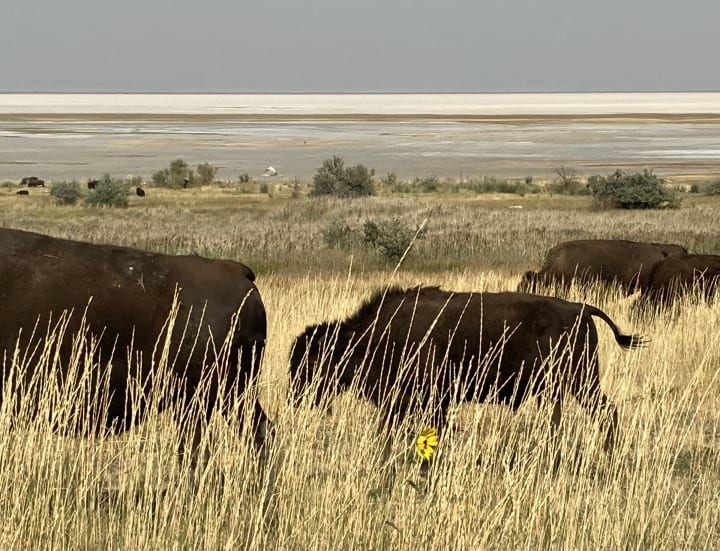If We Stood on the Shore
Poem by N. Wilkinson with Latin text attributed to Thomas of Celano (c.1200–1265)

If we stood together on the shore of the Great Salt Lake and cried our tears until none were left, would the brine shrimp return?
Lacrimosa dies illa
Qua resurget ex favilla
Judicandus homo reus.
Would the starving birds be filled?
Would a great enough sorrow alleviate the destruction we have caused?What justice does sorrow hold when it cannot mitigate death?
They are inequivalent concepts.
What is the composition of tears?
From E=mc² we are born, mc²=E our dust returns in a cycle of endless incarnation.
Energy to matter, matter to energy.
Lacrimosa dies illa
Qua resurget ex favilla
Judicandus homo reus.
Moving water, we wrest it from one place and deposit it in another.
Use it clean and living; return it sullied in the throes of death.
We are living at the expense of all else.
We return to the earth only our refuse and the dust of our bodies.
Lacrimosa dies illa
Qua resurget ex favilla
Judicandus homo reus.
E=mc²
If we cried together until we were dry as the lake bed and, shrinking like Alice, fell into our own tears and swam, would the Wonderland return?
I listen to the voices of scientists while driving along the dehydrated shore.
I have never heard a biologist cry before.
They know a lake we can only imagine, not her silent, inanimate bed, but a pool of riches.
Lacrimosa dies illa
Qua resurget ex favilla
Judicandus homo reus.
At the end of life, our tears are fewer.
Therefore, the young must cry.
~
There is life in salted water.
A being on the verge of death, in hospice, to use our own euphemism.
To break it gently to the living that there is no justice in death.

Thank you for reading my words. We took a trip out to Salt Lake City this September to visit a daughter who lives in the western United States. We spent some time on the Great Salt Lake, which has receded 1–2 miles from its traditional shoreline in many places. The cover photo of Robert Smithson's 1970 piece Spiral Jetty taken in September of 2022, demonstrates the extent to which the water has receded from the shore. The art installation is designed to be surrounded by water. The rocks are usually white with salt.
Some of the material I used as inspiration for this piece is indicated below:
While we were driving around the lake, a friend sent us a must-listen-to podcast about the state of the lake by RadioWest entitled, “ The State and Fate of the Great Salt Lake, Part IV”.
While researching the composition of tears compared to the composition of salt water I found a collective poetry project called “irreplaceable: a collective praise poem for Great Salt Lake” by Nan Seymour and others. It has some very beautiful lines.
The Latin in my verses is taken from Mozart’s Requiem Mass written in 1791. The text is attributed to Thomas of Celano (c.1200–1265). This text also came to mind while researching tears. An approximate English translation (I am not a Latin scholar) of the text reads:
On a tearful day, man(kind) will rise from the ashes to be judged.
I also want to thank Medium author Tyler Neylon. Without his informative article, E=mc² would look like E=mc2. Thank you to the folks at Google Translate, Wikipedia, and Grammarly. I don’t know how I lived without you.
This poem was originally published on Medium.
About the Creator
Natalie Wilkinson
Writing. Woven and Printed Textile Design. Architectural Drafting. Learning Japanese. Gardening. Not necessarily in that order.
IG: @maisonette _textiles
Reader insights
Outstanding
Excellent work. Looking forward to reading more!
Top insight
Heartfelt and relatable
The story invoked strong personal emotions






Comments (4)
Well done!!! Subscribed 💖💖💕
What a powerful poem! One of the best I have read on Vocal. Raises so many questions, while giving us the option to choose our own answer. Have you thought of turning it into a spoken word piece?
Lovely. The opening line is my favorite part. 💕
Beautiful